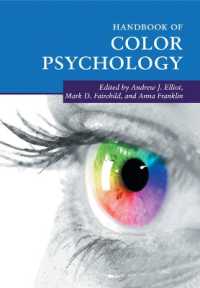Full Description
Community-based Language Learning offers a new framework for world language educators interested in integrating community-based language learning (CBLL) into their teaching and curricula. CBLL connects academic learning objectives with experiential learning, ranging from reciprocal partnerships with the community (e.g., community engagement, service learning) to one-directional learning situations such as community service and site visits.
This resource prepares teachers to implement CBLL by offering solid theoretical frameworks alongside real-world case studies and engaging exercises, all designed to help students build both language skills and authentic relationships as they engage with world language communities in the US. Making the case that language learning can be a tool for social change as well, Community-based Language Learning serves as a valuable resource for language educators at all levels, as well as students of language teaching methodology and community organizations working with immigrant populations.
Contents
Table of Contents
Acknowledgements
Introduction
Chapter One: A Theoretical Framework for CBLL
Chapter Two: Student Learning Outcomes
Chapter Three: Assessment Design
Chapter Four: Identity, Language, and Power
Chapter Five: Dissonance, Resistance, and Transformative Learning
Chapter Six: Authentic and Ethical Partnerships
Appendixes
Credits
References








